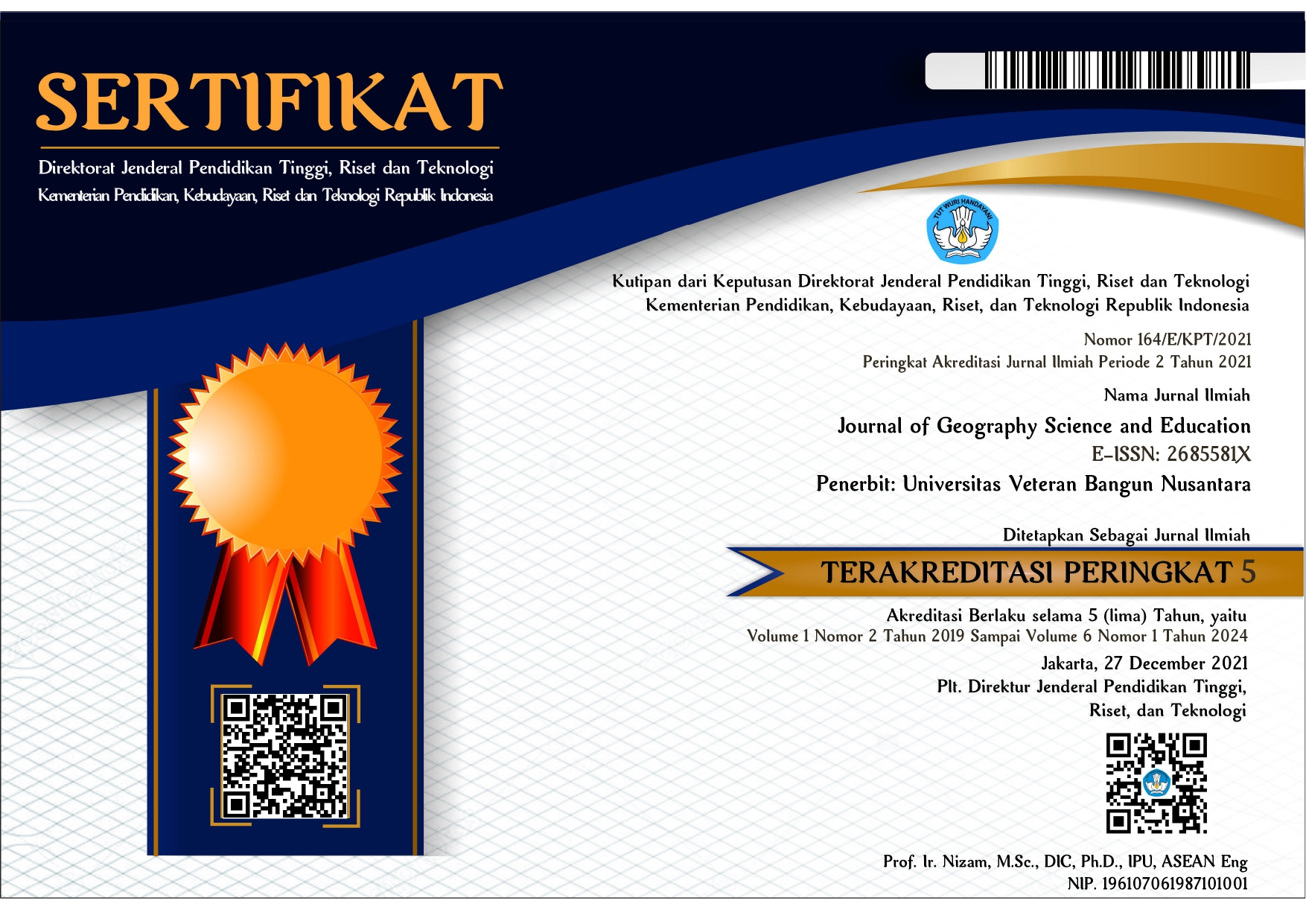THE INFLUENCE OF INDUSTRY ON THE KNOWLEDGE SOCIAL ECONOMY OF ENTREPRENEUR IN KARANGANYAR VILLAGE, WERU DISTRICT, SUKOHARJO REGENCY, 2020
DOI:
https://doi.org/10.32585/jgse.v2i2.1363Kata Kunci:
distribution, marketing reach, socio-economyAbstrak
This study aims to determine the distribution map of tofu industry in Karanganyar Village, Weru District, Sukoharjo Regency, to know the marketing coverage of the tofu industry in Karanganyar Village, Weru District, Sukoharjo Regency, to determine the socio-economic characteristics of tofu entrepreneurs in Karanganyar Village, Weru District, Sukoharjo Regency.
This research used a qualitative descriptive. Data collection techniques used field observations, questionnaires and documentation. The data analysis technique used data reduction, data presentation, drawing conclusions / verification. The results of this study are the distribution of tofu industry in Karanganyar Village, Weru District, Sukoharjo Regency, there are 44 industries spread in several hamlets. The marketing coverage of the tofu industry in Karanganyar Village covered the area throughout Soloraya and Yogyakarta such as Sukoharjo, Klaten, Wonogiri, Karanganyar, and Gunungkidul. The socio-economic characteristics of entrepreneurs are the majority of men, aged 15-64 years, are married, average education level is elementary school, length of business is 10-30 years, working hours are 7-10 hours per day, income level is more than IDR 2,000,000
and family dependents of less than 3 people. The socio-economic characteristics of the workers are the majority of men, aged 15-64 years, married status, average education level of elementary school, working more than 10 years, working hours 7-10 hours per day, income level of IDR 1,000,000 - IDR 2,000,000 and family dependents of less than 3 people.
Unduhan
Referensi
Basrowi dan Siti Juariyah. 2010. Analisis Kondisi Sosial Ekonomi Dan Tingkat Pendidikan Masyarakat Srigading Kecamatan Labuhan Maringgai Kabupaten Lampung Timur. Jurnal Ekonomi dan Pendidikan 7(1) 58-81.
Darsih. 2017. Peranan Sektor Industri Kecil Batu Bata Press Dalam Meningkatkan Pendapatan Masyarakat Di Kecamatan Tenayan Raya Kota Pekanbaru. Jurnal JOM Fekon, 4 (1), 956-967.
Edy Irwansyah. 2013. Sistem Informasi Geografis: Prinsip Dasar dan Pengembangan Aplikasi. Yogyakarta: Digibooks.
Hardiyanti, Qomariah. 2011. Kajian Kualitas Tahu Dari Kacang Tunggak dan Kedelai. Skripsi. Universitas Pembangunan Nasional “Veteran” Jawa Timur.
Kasmir. 2018. Pemasaran Bank. Jakarta: Kencana.
Mahakertha, Pande & Yuliarmi. 2019. Analisis Pengaruh Faktor Sosial Ekonomi Terhadap Keputusan Ibu Rumah Tangga Untuk Bekerja Di Desa Pemogan. E-Jurnal Ekonomi Pembangunan Universitas Udayana 8(9) 2009-2039.
Moleong, Lexy. J. 2017. Metode Penelitian Kualitatif. Bandung: Rosda Karya.
Salim, E. 2012. Kiat Cerdas Wirausaha Aneka Olahan Kedelai. Jakarta: Andi Offset.
Saraswati. Sawitri & Arwan Putra. 2016. Analisis Perubahan Luas Dan Pola Persebaran Permukiman (Studi Kasus: Kecamatan Tembalang, Kecamatan Banyumanik, Kecamatan Gunungpati, Kecamatan Mijen Kota Semarang Jawa Tengah). Jurnal Geodesi Undip 5(1) 155-163.
Sembiring, R. 2018. Dampak Perubahan Budaya Sosial Ekonomi Terhadap Kemiskinan Dan Kesejahterahan Pada Masyarakat Desa Pahlawan. Jurnal Kajian Ekonomi dan Kebijakan Publik 3(1) 75-82.
Sugiyono. 2017. Metode Penelitian Kuantitatif, Kualitatif dan R & D. Bandung : Alfabeta.
Unduhan
Diterbitkan
Cara Mengutip
Terbitan
Bagian
Lisensi
License and Copyright Agreement
In submitting the manuscript to the journal, the authors certify that:
- They are authorized by their co-authors to enter into these arrangements.
- The work described has not been formally published before, except in the form of an abstract or as part of a published lecture, review, thesis, or overlay journal. Please also carefully read JGSE's Posting Your Article Policy at http://pubs2.ascee.org/index.php/ijele/about/editorialPolicies#custom-5
- That it is not under consideration for publication elsewhere,
- That its publication has been approved by all the author(s) and by the responsible authorities – tacitly or explicitly – of the institutes where the work has been carried out.
- They secure the right to reproduce any material that has already been published or copyrighted elsewhere.
- They agree to the following license and copyright agreement.
Copyright
Authors who publish with Journal of Geography Science and Education agree to the following terms:
- Authors retain copyright and grant the journal right of first publication with the work simultaneously licensed under a Creative Commons Attribution License (CC BY-SA 4.0) that allows others to share the work with an acknowledgment of the work's authorship and initial publication in this journal.
- Authors are able to enter into separate, additional contractual arrangements for the non-exclusive distribution of the journal's published version of the work (e.g., post it to an institutional repository or publish it in a book), with an acknowledgment of its initial publication in this journal.
- Authors are permitted and encouraged to post their work online (e.g., in institutional repositories or on their website) prior to and during the submission process, as it can lead to productive exchanges, as well as earlier and greater citation of published work.
Licensing for Data Publication
Journal of Geography Science and Education use a variety of waivers and licenses, that are specifically designed for and appropriate for the treatment of data:
- Open Data Commons Attribution License, http://www.opendatacommons.org/licenses/by/1.0/ (default)
- Creative Commons CC-Zero Waiver, http://creativecommons.org/publicdomain/zero/1.0/
- Open Data Commons Public Domain Dedication and Licence, http://www.opendatacommons.org/licenses/pddl/1-0/
Other data publishing licenses may be allowed as exceptions (subject to approval by the editor on a case-by-case basis) and should be justified with a written statement from the author, which will be published with the article.
Open Data and Software Publishing and Sharing
The journal strives to maximize the replicability of the research published in it. Authors are thus required to share all data, code or protocols underlying the research reported in their articles. Exceptions are permitted but have to be justified in a written public statement accompanying the article.
The associated persistent identifiers (e.g. DOI, or others) of the dataset(s) must be included in the data or software resources section of the article. Reference(s) to datasets and software should also be included in the reference list of the article with DOIs (where available). Where no domain-specific data repository exists, authors should deposit their datasets in a general repository such as ZENODO, Dryad, Dataverse, or others.
Small data may also be published as data files or packages supplementary to a research article, however, the authors should prefer in all cases a deposition in data repositories.










